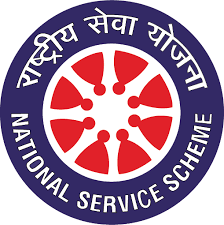The National Service Scheme was started by Government of India, Ministry of Education and Culture, Govt. of India, in Collaboration with State Government in the year 1969 in 37 selected Universities. . National Service Scheme is an Indian Government sponsored programme under the Department of Youth Affairs & Sports of the Government of India. It was launched in Gandhiji’s Centenary year, 1969, aimed at “Developing Student’s Personality through Community Service”. National Service Scheme is a Nobel experiment in academic expansion. It inculcates the spirit of voluntary work among the students and teachers through sustained community interaction. It brings academic institutions closer to society.
NSS MOTTO
The motto of NSS is “NOT ME, BUT YOU”. This expresses the essence of democratic living and upholds the need for selfless services and appreciation of another man’s point of view and also show consideration for fellow human beings. It insists that the welfare of an individual is ultimately dependent on the welfare of the society as a whole.
NSS SYMBOL
The symbol of the National Service Scheme is based on the ‘Rath ‘wheel of the Konark Sun Temple situated in Orissa. These giant wheels of the Sun Temple portray the cycle of creation, preservation and release, and signify the movement in life across time and space. The design of the symbol, a simplified form of the Sun-chariot wheel primarily depicts movement. The wheel signifies the progressive cycle of life. It stands for continuity as well as change and implies the continuous striving of NSS for social transformation and upliftment.
NSS DAY
NSS was formally launched on 24th September, 1969, the birth centenary year of the Father of the Nation. Therefore, 24 September is celebrated every year as NSS DAY with appropriate programmes and activities. All the activities should be focused towards achieving the objectives of NSS.
NSS OBJECTIVES
- To enable the students to understand the community in which they
- To understand themselves in relation to their
- To develop among themselves a sense of social and civic responsibility
- To find practical solution to individual and community problems
- To develop competence required for group living and sharing responsibilities
- Gain skills in mobilizing community
- To acquire leadership qualities and democratic attitude.
NGM NSS CELL
The NGM NSS Cell aims at developing citizens with value based knowledge, skill, character and contributing to social transformation and national development. It induces everyone to selfless services. The first unit with 100 members began to function in the year 1972. The second, third and fourth units was started in the year 1976, 2002 and 2004 respectively. Today, there are THREE NSS units serving in our institution with 300 vibrant volunteers
OBJECTIVES
- To develop the students to serve for
- To provide an opportunity to the students to know the dignity of labour, self-discipline, the qualities of patriotism and secularism.
- To channelize the youth energy to bring about changes for the development of
- To help the villagers to earn general
- To help the villagers to develop their economic condition to face the modern necessities
- To inculcate the community, the spirit of nationalism, self-reliance and professional culture or the betterment of both the individual and the nation.


